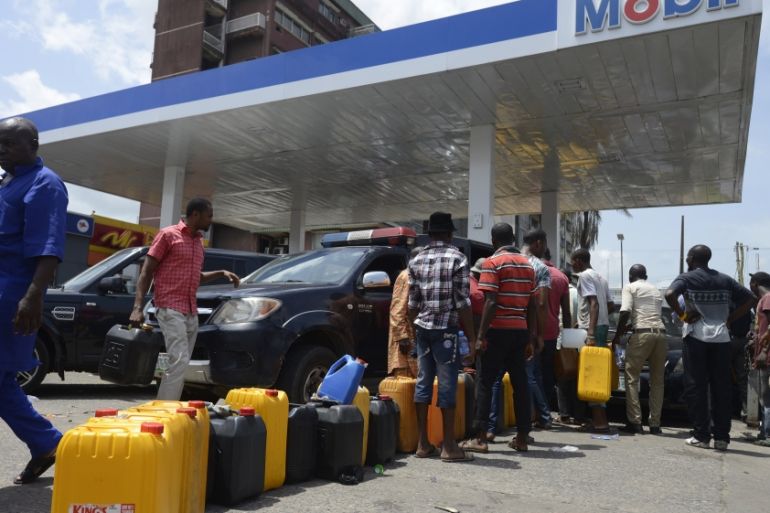Nigeria fuel crisis takes rising economic toll
Motorists bear brunt of shortage seen by some as linked to political transition in Africa’s leading oil producer.

Nigeria is facing a prolonged fuel-supply crisis that is taking a severe toll on the country’s economy, living conditions, and basic services, reports say.
The shortage in Africa’s leading oil producer has forced an increasing number of drivers in Lagos to stop using their personal vehicles, but prices for commuters on public transport have more than doubled.
Keep reading
list of 4 items‘We need you’: Solomon Islands’ support for US agency’s return revealed
Why are nations racing to buy weapons?
Parallel economy: How Russia is defying the West’s boycott
Black market vendors have been selling petrol at about $0.70 per litre – almost double the official price.
At Lagos domestic airport on Thursday morning, passengers were told all flights were delayed because there was no aviation fuel.
Felix Onuah, a Nigerian journalist, told Al Jazeera from Abuja on Thursday that many companies and businesses have been forced to shut down due to a dearth of supplies.
“There is a serious crisis. About eighty percent of petrol stations do not have fuel in the country,” he said.
“It has also caused a lot of hardship because the shortage has caused a sharp rise in transportation costs and other services associated with fuel.”
Nigerian motorists have borne the brunt of the shortages, with long queues at petrol stations in major cities, including the capital, the oil-producing hub of Port Harcourt and Kano in the north.
Toll on employment
Musa Yusuf, director-general of Lagos Chamber of Commerce and Industry, told AFP news agency that “many companies have shut down because they cannot get diesel to fuel their plants”.
He also warned that the fuel crisis could take a major toll on employment.
“Unless the situation is redressed, companies may be forced to lay off [staff],” Yusuf said.
Nigeria produces about two million barrels of crude oil a day but despite its huge reserves, it imports much of its fuel due to a lack of refining capability – a situation blamed on corruption and mismanagement.
The government’s fuel-subsidy programme has also been found to be rife with corruption, including false claims and overpayments.
In January 2012, the government tried to end the fuel subsidies, causing petrol prices to more than double.
It was forced to partially reinstate them after tens of thousands of people took to the streets in violent protests that left more than a dozen dead.
Onuah, the Abuja-based journalist, said oil and gas is normally subsidised by the state, but the government does not have the funds to pay for it anymore.
“Suppliers claim they have stopped distributing fuel because the outgoing government led by President Goodluck Jonathan still owes them more than $1bn,” he told Al Jazeera.
He said the suppliers fear that the incoming administration of President Muhammadu Buhari, who takes office next Friday, would not make up for the unsettled payments.
Ryan Rifai in Doha contributed to this report